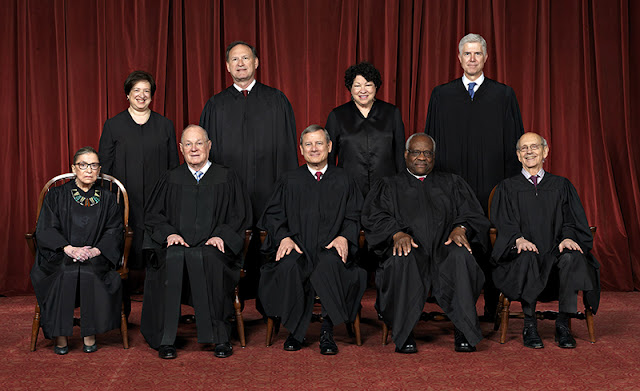I'm Back, And So Is The Supreme Court
My apologies for being away so long. While not intended, it did give me some time to tweak the blog a bit, and the soon-to-be-in session U. S. Supreme Court (it's only 18 days until October 2, the "first Monday in October" when the Court officially starts its term) couldn't be a better time to get back into what will be more frequent posting. There will also be occasional historical tidbits and suggestions for reading (including what I am reading).
By any measure, this term will produce decisions that will have far-reaching consequences (both society-wide and potentially over time) for issues such as the First Amendment free exercise and speech clauses, Fourth Amendment search and seizure, elections, immigration, and the federal/state relationship concerning who can regulate within the state's borders (I guarantee you will love that one). It sounds like that would be plenty for a term that lasts until the end of June 2018, but in fact there are only 32 cases currently accepted for review and because some are consolidated, there are only 28 arguments scheduled so far, barely enough to fill the first three argument sessions (that's just October and early November) and is only half of the Court's normal argument docket. (You can check out the Supreme Court's calendar and current argument lists here). Cert petitions (filings asking the Supreme Court to review the decision below) have been filed all summer, and the Court will have its annual "long conference" on September 25, where it will decide the fate of over 1,000-2,000 petitions and other matters. There are some noteworthy petitions, including Microsft Corp. v United States which concerns the ability of the government to compel a company to produce data stored in servers in a foreign country, in this case, emails stored on an Irish server, which is why it's also called the "Microsoft Ireland" case. (Microsoft won in the courts below, thus not having to produce the emails. The government is seeking review in the Supreme Court. The petition will be discussed at the October 6 conference; a grant is expected).
I'm sure you know some of the cases already, by topic if not by formal case name: the "travel/Muslim ban" case; the gerrymandering case; the "gay wedding cake" case, the cell phone privacy case. As noted by the Supreme Court Institute at Georgetown (https://www.law.georgetown.edu/academics/centers-institutes/supreme-court-institute/index.cfm) there are seven "term highlight" cases out of the 32 which have already been accepted. In the posts that follow, I will preview all seven. As the term goes on, I will mention any grants or denials of cert that seem important, try to give you a sense of the arguments and of course the opinions once they are handed down, and the quirky case or cert petition just to keep it a bit light (although this term will be anything but). Other legal postings too.
And since one of the points of this blog is "legal education for everyone", here is a link to SCOTUSblog's Glossary of Legal Terms, a very handy 2-page guide to the terms used in Supreme Court litigation. http://www.scotusblog.com/reference/educational-resources/glossary-of-legal-terms/ Print these two pages out and never be confused again by Supreme Court terminology (or by me). And here is a much longer (18 pages) glossary from the United States Courts covering most terminology used in federal courts. A good page to bookmark, handy when you read Supreme Court cases (which I hope you do).
As always, I appreciate your patience, your staying tuned and telling your friends about the blog. And a big thank you to the folks who gave me a shout out (and prodding!) during the past two weeks. You know who you are.
Comments, questions, and suggestions for topics always welcome.




Comments
Post a Comment